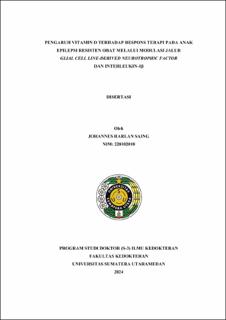Pengaruh Vitamin D terhadap Respons Terapi pada Anak Epilepsi Resisten Obat melalui Modulasi Jalur Glial Cell Line-Derived Neurotrophic Factor dan Interleukin-1β
The Effect of Vitamin D on Therapeutic Response in Drugresistant Epileptic Children Through Modulation of The Glial Cell Line-Derived Neurotrophic Factor Pathway and Interleukin-1β

Date
2024Author
Saing, Johannes Harlan
Advisor(s)
Sari, Dina Keumala
Supriatmo
Fitri, Aida
Metadata
Show full item recordAbstract
Introduction. Drug-Resistant Epilepsy (DRE) is defined as failure of two anti-epileptic
drugs (AEDs) to control seizures continuously. Vitamin D could be alternative therapy
by increasing GDNF and decreasing IL-1β, but its role in epilepsy was still limited. This
study aims to analyze the effects of vitamin D supplementation on the therapeutic
response in DRE patients.
Methods. This double-blind, randomized controlled trial was conducted on DRE patients
treated at Adam Malik Hospital. Children on chronic AED treatment, still experiencing
seizures, not taking vitamin D, compliant with medication, and whose parents agreed to
participate were included in the study. Patients with medical conditions or treatment
affecting bone metabolism, hypersensitivity to vitamin D, or those who dropped out were
excluded. Participants were randomly selected and received either vitamin D
supplementation or placebo for 12 weeks.
Results. Most subjects had vitamin D deficiency with high seizure frequency that was
not controlled by conventional AEDs. After supplementation, serum vitamin D levels
increased significantly (from 25.11 ± 9.27 to 38.21 ± 11.34), accompanied by significant
decrease in GDNF (from 3.46 ± 2.73 to 1.72 ± 1.53), IL-1β levels (from 385.27 ± 313.20
to 191.57 ± 140.01), and seizure frequency (from 125.54 ± 186.34 to 23.24 ± 42.37). A
significant negative correlation was found between the increase in vitamin D levels and
reduction in seizure frequency, but no correlation was observed between changes in
GDNF and IL-1β levels with seizure frequency.
Conclusion. Vitamin D supplementation can reduce seizure frequency but not through
modulation of GDNF and IL-1β.
Collections
- Doctoral Dissertations [194]
